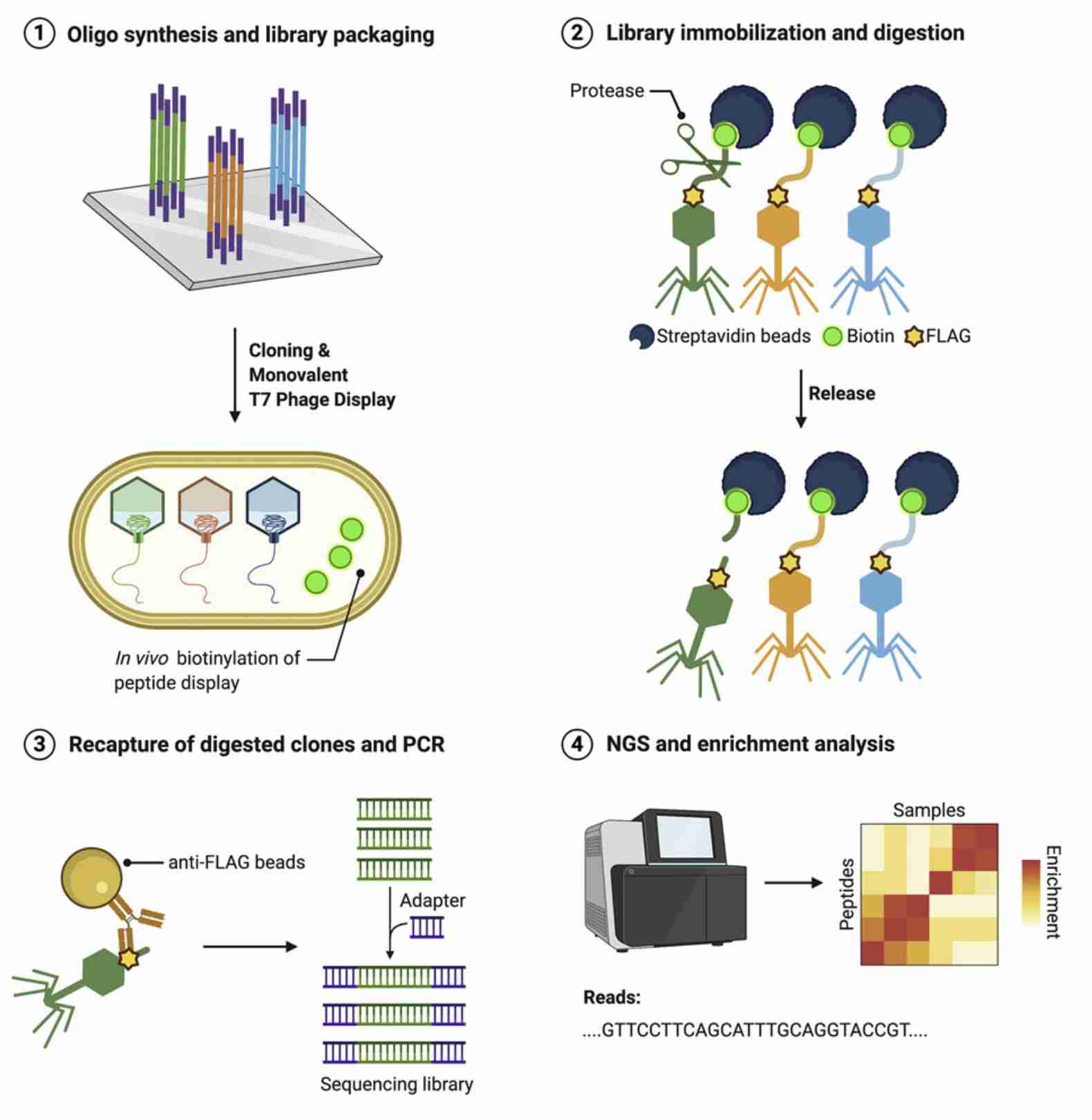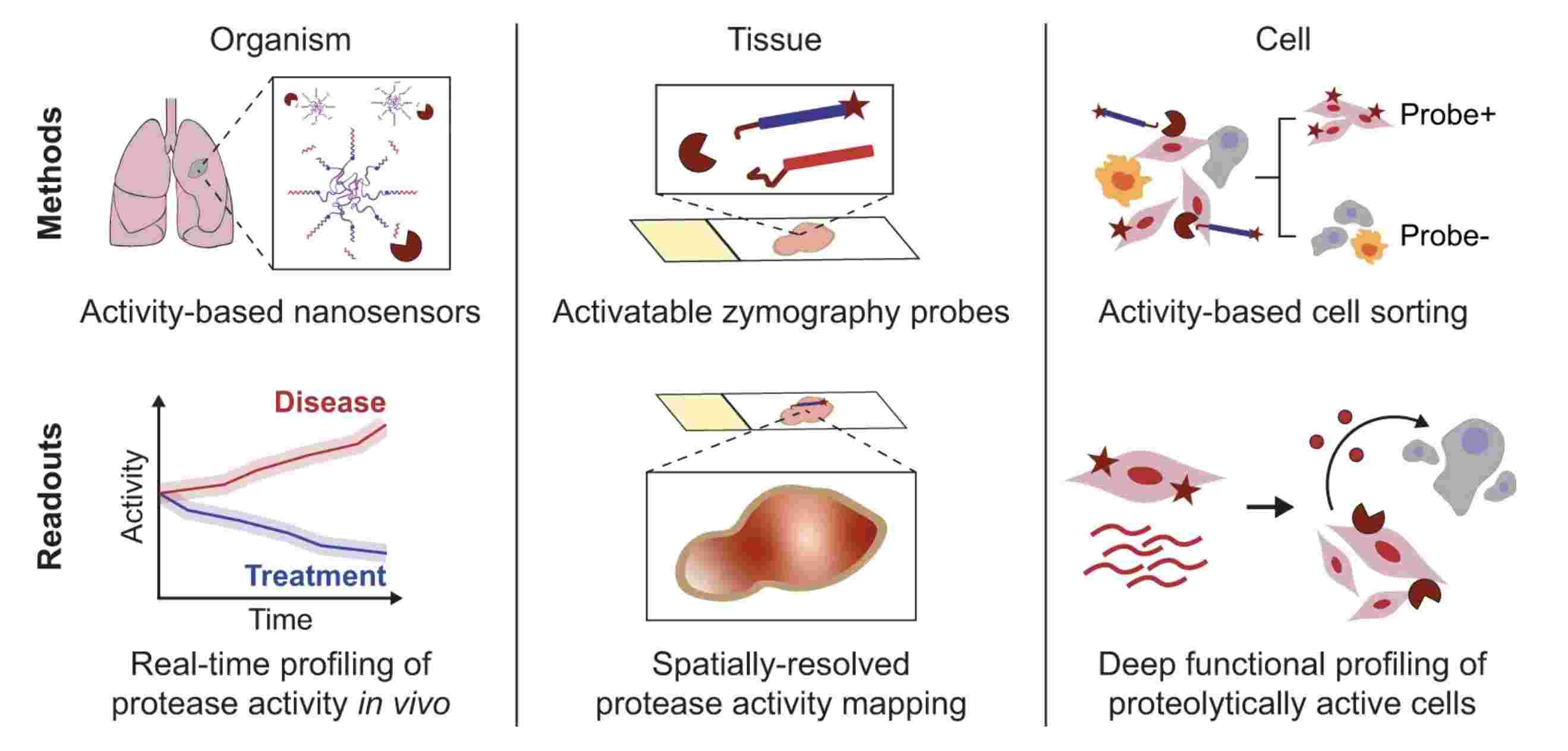Protease Screening and Profiling is a key technique used by scientists to understand the role of proteases in various biological processes. As the main components that contribute to protein degradation, proteases are crucial in numerous biological and pathological processes. These include cell cycle progression, DNA repair, cell death, and inflammation, among others. Therefore, understanding the functions, substrates, and inhibitors of these proteases is not merely optional but essential, especially in drug discovery and development fields.
 Protease Activity Profiling via Programmable Phage Display of Comprehensive Proteome-Scale Peptide Libraries (Gabriel D. Román-Meléndez, et al., 2020)
Protease Activity Profiling via Programmable Phage Display of Comprehensive Proteome-Scale Peptide Libraries (Gabriel D. Román-Meléndez, et al., 2020)
Service Process
Our service process has been meticulously crafted to guarantee the best possible outcomes for our clients. We strictly adhere to a systematic and methodical procedure which consists of several distinct stages:
- Client Consultation: This involves an in-depth discussion with the client about the project's objectives, the desired or anticipated results, and the proposed timelines. We believe in the importance of clear communication and mutual understanding to ensure that we are perfectly aligned with our client's expectations.
- Sample Preparation: In this phase, we prepare the samples for subsequent screening and profiling. This involves processing the samples into a state that is suitable for detailed analysis. Our team of experts follows stringent protocols to maintain the integrity of the samples.
- Protease Screening: At this critical juncture, we identify any active proteases present in the samples. Our state-of-the-art tools and methodologies allow us to detect these proteases with high accuracy and precision.
- Protease Profiling: During this comprehensive stage, we go beyond mere identification. We thoroughly characterize the identified proteases, providing a wealth of information about their specific traits and characteristics. This includes, but is not limited to, their activity levels, substrate preferences, and potential inhibitors.
- Data Analysis: This final stage involves a thorough evaluation of the data collected from the screening and profiling stages. Our skilled analysts interpret this data, translating it into detailed, easy-to-understand reports. These reports provide our clients with valuable insights and recommendations based on the findings.
If you have any questions, need more information, or would like to discuss a potential project, please don't hesitate to contact us. Our team is always eager to help and share our expertise.
Applications
| Application |
Methods |
Description |
| Drug Discovery |
Fluorogenic Substrates, Inhibitor Assays |
Protease screening is crucial in drug discovery to identify potential drug targets and inhibitors. Fluorogenic substrates are commonly used to measure protease activity, while inhibitor assays assess the effectiveness of potential drug compounds. |
| Disease Diagnosis |
Mass Spectrometry, Zymography |
Protease profiling aids in disease diagnosis by identifying protease biomarkers associated with specific conditions. Mass spectrometry enables the detection and quantification of proteases in biological samples, while zymography visually detects protease activity in gels. |
| Biotechnology |
Protein Microarrays, High-Throughput Assays |
In biotechnology, protease screening is utilized to engineer enzymes for various applications. Protein microarrays allow for the high-throughput screening of protease-substrate interactions, facilitating the selection of enzymes with desired specificities and activities. |
| Enzyme Engineering |
Directed Evolution, Rational Design |
Protease screening plays a pivotal role in enzyme engineering to develop proteases with enhanced properties. Directed evolution involves iterative rounds of mutation and selection, while rational design utilizes structural information to engineer proteases. |
| Cancer Research |
Immunohistochemistry, ELISA |
Protease profiling is essential in cancer research to understand tumor progression and metastasis. Immunohistochemistry allows for the localization of proteases in tumor tissues, while ELISA quantifies protease levels in patient samples. |
| Food Industry |
Activity Assays, Substrate Specificity Analysis |
Protease screening is utilized in the food industry to optimize enzymatic processes and improve product quality. Activity assays measure protease activity in food matrices, while substrate specificity analysis determines enzyme specificity. |
Case Study
Tracking changes in biomolecule activity is critical for understanding tumor progression and developing precision cancer drugs. While omics technologies enable advanced genome and transcriptome analysis, methods for analyzing protein activity are limited. The figure below illustrates a comprehensive approach to analyzing protease activity in cancer at different scales, including in vivo non-invasive detection, spatial localization in tissues, and single-cell analysis. These techniques provide new insights into cancer biology and potential diagnostic and therapeutic strategies. (Top) Methods for profiling protease activity across the organism, tissue, and cellular scales. Noninvasive activity-based nanosensors can be translated into activatable probes for in situ zymography and activity-based cell sorting. (Bottom) Method readouts enable noninvasive, real-time monitoring of in vivo protease activity over tumor progression and treatment response; spatially-resolved activity mapping of the TME; and single-cell isolation and multimodal characterization of proteolytically active cells.
 Multiscale profiling of protease activity in cancer (Ava P. Amini, et al., 2022)
Multiscale profiling of protease activity in cancer (Ava P. Amini, et al., 2022)
FAQs
Here are some frequently asked questions and answers about Protease Screening and Profiling, a technique crucial in understanding proteases' roles in biological processes and diseases, drug discovery, and biomarker discovery. If you have more specific or detailed questions, don't hesitate to get in touch with us directly.
Q: What role does Protease Screening and Profiling play in drug discovery?
A: Proteases are implicated in a wide array of diseases, such as cancer, infectious diseases, and neurological disorders. Because of this, they are a significant target in drug discovery. Protease Screening and Profiling allows researchers to gain insights into the activities, substrates, and inhibitors of these enzymes. This knowledge aids in the development of effective and targeted drugs, by providing crucial information about potential drug targets and therapeutic strategies.
Q: Could you differentiate between Screening and Profiling?
A: Screening and Profiling are two complementary processes used in Protease Screening and Profiling. Screening is the initial process that seeks to identify proteases that are active under specific conditions. This stage involves testing a large number of proteases to identify those that are active and could potentially be involved in the disease process. Once these proteases are identified, profiling comes into play. Profiling involves the in-depth characterization of these active proteases. It gives detailed information about their behavior, functionality, substrates, and potential inhibitors. Profiling provides insights into the proteases' roles in biological processes and can highlight how changes in their activity could contribute to disease.
Q: How does Protease Screening and Profiling contribute to Biomarker Discovery?
A: Protease Screening and Profiling can be instrumental in biomarker discovery. Proteases play significant roles in various biological processes, including cell growth, apoptosis, and inflammation. Alterations in their activity can often indicate pathological conditions, making them potential biomarkers for specific diseases. By identifying and characterizing these proteases, researchers can discover novel biomarkers that can be used in disease diagnosis, prognosis, and monitoring therapeutic responses.
Q: How does Protease Screening and Profiling support Academic Research?
A: Protease Screening and Profiling supports academic research by providing a deeper understanding of the roles of proteases in biological processes and diseases. This can lead to the discovery of new biological pathways and mechanisms of disease progression, which can further our understanding of biology and medicine.
Q: How significant is Protease Screening and Profiling in Drug Development?
A: Protease Screening and Profiling is crucial in drug development. By understanding the roles, substrates, and inhibitors of proteases, researchers can identify potential drug targets and develop therapeutics that can modulate these enzymes' activities. This can lead to the development of more effective and targeted treatments for a range of diseases.
Q: How is Protease Screening and Profiling performed?
A: Protease Screening and Profiling involves several steps. Firstly, samples are prepared and tested to identify active proteases. Once these proteases are identified, they are characterized to provide detailed information about their behavior, substrates, and potential inhibitors. Finally, the data obtained is analyzed and interpreted to provide insights into the proteases' activities and their potential implications in diseases.
Q: What other fields can benefit from Protease Screening and Profiling?
A: Apart from drug discovery, biomarker discovery, clinical diagnostics, and academic research, Protease Screening and Profiling can also benefit areas such as biotechnology, agriculture, and veterinary science. Any field that involves studying biological processes can potentially benefit from the insights provided by Protease Screening and Profiling.
Q: What future developments are expected in Protease Screening and Profiling?
A: Future developments in Protease Screening and Profiling may involve the use of advanced technologies like high-throughput screening, machine learning, and artificial intelligence to improve the speed, efficiency, and accuracy of the process. This could lead to the discovery of novel proteases and their roles in diseases, opening new avenues for drug discovery and development.

































 Protease Activity Profiling via Programmable Phage Display of Comprehensive Proteome-Scale Peptide Libraries (Gabriel D. Román-Meléndez, et al., 2020)
Protease Activity Profiling via Programmable Phage Display of Comprehensive Proteome-Scale Peptide Libraries (Gabriel D. Román-Meléndez, et al., 2020) Multiscale profiling of protease activity in cancer (Ava P. Amini, et al., 2022)
Multiscale profiling of protease activity in cancer (Ava P. Amini, et al., 2022)